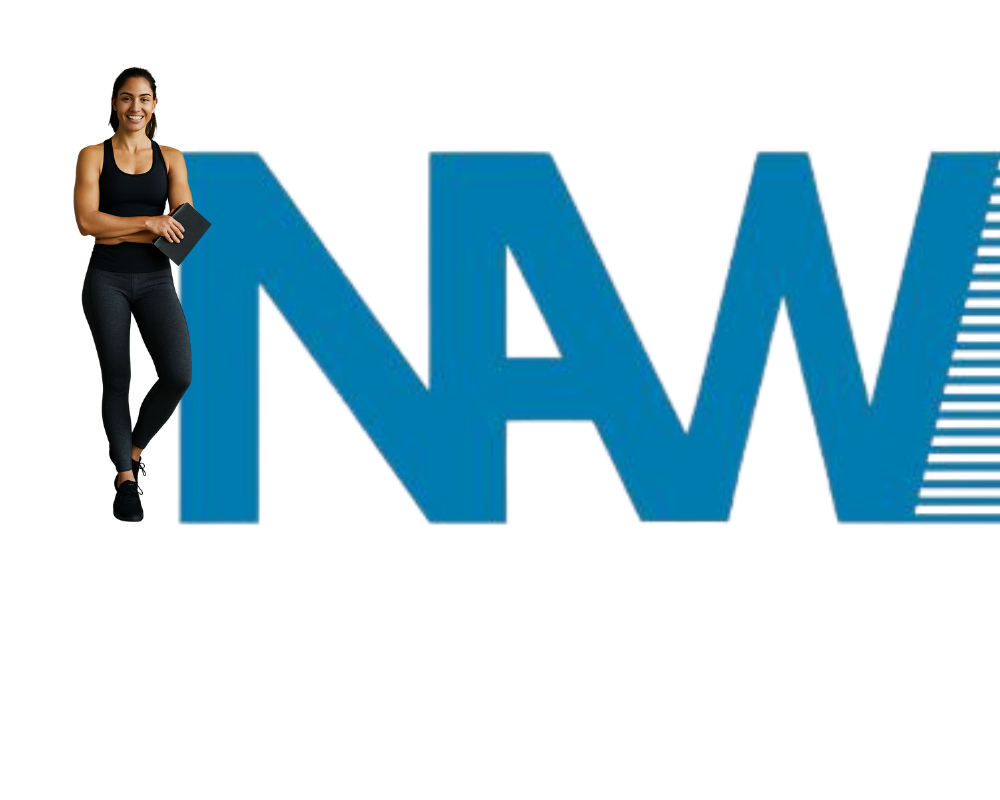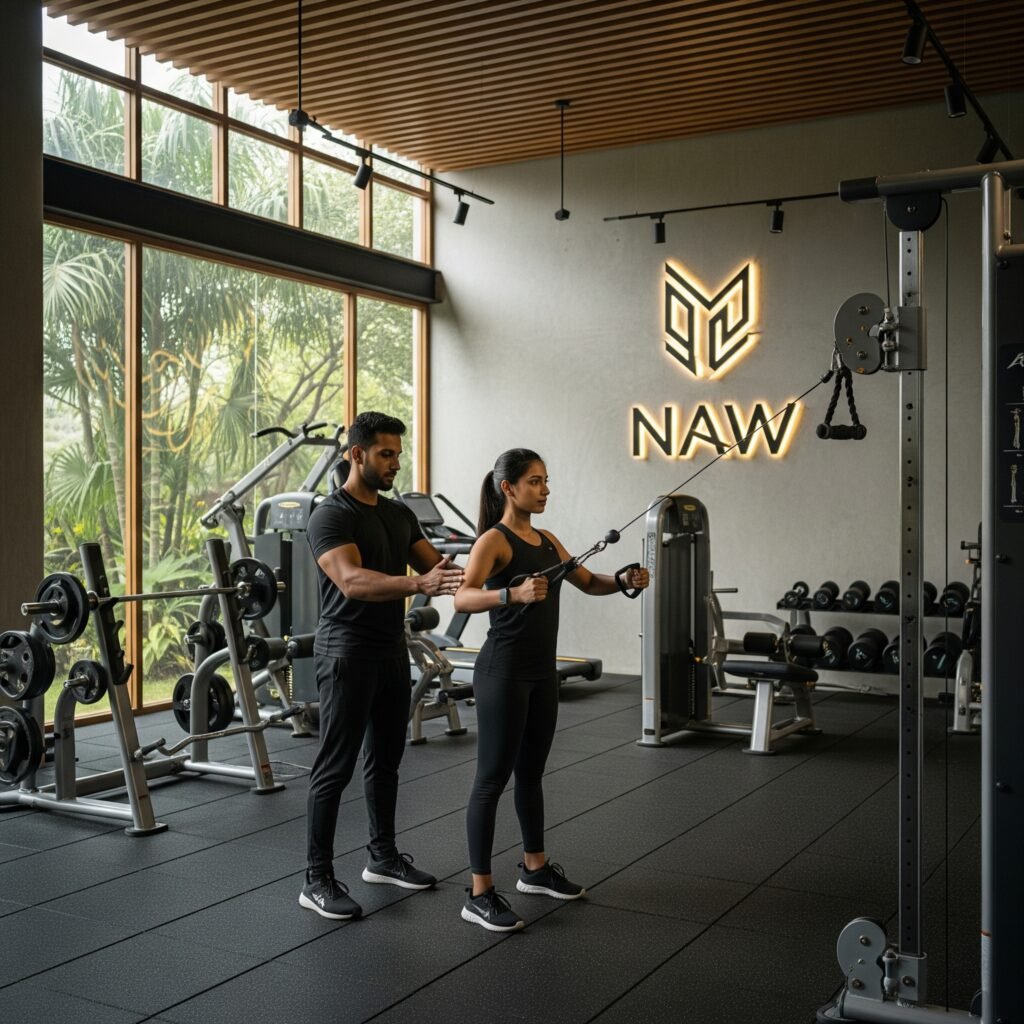we help you serve the world
- Research Based Courses
- Application Based Courses
- 3 Months Internship

Level 1: CPT
Comprehensive entry-level program equipping future personal trainers with essential fitness knowledge, coaching skills, and professionalism.
Level 2: CPT
Advanced certification focusing on program design, performance optimization, client assessment, and specialized training techniques.
Foundational nutrition course empowering coaches to guide healthy habits, improve performance, and support client goals.
Advanced coaching strategies to master behavior change, personalize nutrition plans, and achieve lasting client transformations
About Us
"Educate. Empower. Elevate Wellness.
At National Academy of Wellness, fitness is not a trend—it’s a commitment. We are a serious, high-quality fitness academy dedicated to transforming lives through structured training, discipline, and proven wellness practices.
Our approach is clear: no shortcuts, no compromises. We believe in building strength, resilience, and sustainable habits that last a lifetime.
With a team driven by excellence, we ensure every client gets the guidance, support, and results they deserve. When it comes to your health, we don’t take things lightly—because your wellness is our highest priority.

BLOG
Cources
Level 1:CPT
What you will learn
Basic human anatomy and movement
Simple workout planning for general fitness
How to guide, motivate, and support beginners
Essentials of nutrition and healthy living
Introduction to coaching ethics and communication
Why This Course Stands Out:
No experience required — made for true beginners
Taught by expert Indian fitness professionals
Self-paced online modules you can access anytime
Industry-recognized Level 1 certificate
Practical, real-world coaching skills
Level 2: CPT
What You’ll Learn – Level 2:
Applied human anatomy and movement analysis for safe, effective training
Designing progressive workout programs for strength, endurance, and mobility
Coaching techniques for building confidence, consistency, and long-term motivation
Nutrition principles for body composition, performance, and recovery
Practical strategies for client assessment, goal-setting, and progress tracking
Ethical coaching practices, communication styles, and managing boundaries
Introduction to special populations and adapting training for different needs
.
Why This Level 2 Program Stands Out
and movement analysis for safe, effective training
Designing progressive workout programs for strength, endurance, and mobility
Coaching techniques for building confidence, consistency, and long-term motivation
Nutrition principles for body composition, performance, and recovery
Practical strategies for client assessment, goal-setting, and progress tracking
Ethical coaching practices, communication styles, and managing boundaries
Introduction to special populations and adapting training for different needs
Nutrition Coach: Level 1
Nutrition Coach: Level 1 – What You’ll Learn
Basics of macronutrients (carbs, fats, proteins) and micronutrients
Understanding calories and energy balance
How to guide healthy eating habits for general wellness
Simple meal planning and portion control
Introduction to reading food labels and nutrition facts
Fundamentals of hydration and its role in health
Basics of coaching nutrition ethically and effectively
Why Nutrition Coach Level 1 is Perfect for Beginners
Starts with the basics—no prior knowledge needed
Breaks down complex nutrition concepts into easy-to-understand ideas
Focuses on practical skills like meal planning and portion control
Builds confidence to make healthy eating choices and guide others
Teaches ethical coaching so beginners learn to support, not overwhelm
Provides a solid foundation to grow into more advanced nutrition knowledge later
Nutrition Coach: Level 2
Nutrition Coach: Level 2 – What You’ll Learn
In-depth understanding of macronutrient manipulation for different goals
Advanced meal planning tailored to specific needs (weight loss, muscle gain, performance)
Nutrient timing and its impact on energy and recovery
Reading and interpreting food labels and supplements critically
Coaching strategies to support lasting behavior change
Understanding special dietary needs and restrictions
Ethical guidelines for advanced nutrition coaching
Why Nutrition Coach Level 2 is Ideal for Learners
Builds on Level 1 with deeper, practical nutrition science
Equips learners to customize plans for diverse clients and goals
Focuses on long-term habits, not quick fixes
Helps learners confidently handle complex nutrition questions
Prepares learners for advanced certifications or professional coaching roles
How to Become a Personal Trainer in India: A Complete Guide
The fitness industry in India is booming. With rising awareness about health, weight management,
and lifestyle diseases, the demand for qualified personal trainers has never been higher. If you are
passionate about fitness and want to turn it into a rewarding career, becoming a certified personal
trainer can open up incredible opportunities. Here’s a simple, step-by-step guide on how to build a
career as a personal trainer in India.
1. Understand the Role of a Personal Trainer
A personal trainer is more than just someone who demonstrates exercises. Your job includes:
Designing customized workout plans for clients.
Guiding them on proper form and technique.
Understanding fitness levels, goals, and any medical limitations.
Motivating clients to stay consistent and achieve results.
Staying updated with the latest fitness trends and research.
Being a successful trainer requires not just physical fitness but also communication skills, empathy,
and professionalism.
2. Get the Right Education and Certification
While anyone can be passionate about fitness, employers and clients look for trainers with credible
certifications. Here are some of the most recognized personal training certifications in India:
ACE (American Council on Exercise)
NASM (National Academy of Sports Medicine)
ISSA (International Sports Sciences Association)
NSCA (National Strength and Conditioning Association)
INFS (Institute of Nutrition and Fitness Sciences) – an Indian option
Most of these courses cover exercise science, anatomy, physiology, nutrition basics, and client
assessment. They also include practical training and exams.
Tip: Choose a certification that is internationally recognized. It gives you flexibility to work both in
India and abroad.
3. Learn About Nutrition and Special Populations
Fitness today is holistic. Along with workouts, clients expect guidance on healthy eating and lifestyle.
While you don’t have to be a dietitian, gaining knowledge of nutrition helps you design well-rounded
fitness programs.
Additionally, understanding how to work with special populations like seniors, pregnant women, or
people with health conditions (like diabetes or obesity) will make you a more versatile trainer.
4. Develop Practical Skills
Theory is important, but practical application is what sets you apart. You can gain experience by:
Interning at gyms or wellness centers.
Volunteering to train friends or family.
Working with a mentor or senior trainer.
During this stage, focus on correct exercise form, injury prevention, progressive programming, and
client motivation strategies.
5. Choose Your Career Path
Once certified, you can work in different areas of the fitness industry:
Commercial Gyms: Work as a trainer for gym members.
Freelance/Independent Trainer: Train clients at home, online, or in private studios.
Corporate Wellness Programs: Help companies improve employee health.
Online Fitness Coaching: Growing rapidly with the rise of digital platforms.
Many trainers start in gyms to gain experience and later move into independent or online coaching
for higher earnings and flexibility.
6. Build Your Personal Brand
In today’s digital world, building a strong personal brand is crucial. Here’s how you can stand out:
Create a professional Instagram or YouTube page with fitness tips and client
transformations.
Share testimonials and success stories.
Write blogs or articles on fitness topics to showcase your expertise.
Network with other fitness professionals and participate in events or workshops.
The stronger your personal brand, the easier it is to attract high-paying clients.
7. Keep Learning and Upgrading Your Skills
Fitness science is constantly evolving. To stay relevant:
Attend workshops, seminars, and fitness expos.
Upgrade with advanced certifications (like strength and conditioning, corrective exercise, or
nutrition coaching).
Learn about new trends such as functional training, HIIT, yoga, and online fitness coaching.
The more skills you have, the more value you can offer your clients.
8. Expected Salary and Growth Opportunities
As a beginner, you can earn between ₹15,000 to ₹30,000 per month working in a gym. With
experience, specialization, and a strong client base, personal trainers in India can earn ₹50,000 to
₹2,00,000+ per month, especially through online coaching and private clients.
The fitness industry in India is projected to grow significantly, offering long-term career stability for
qualified trainers.
9. Soft Skills Matter Too
Apart from technical skills, personal trainers need:
Good communication and motivational skills.
Professionalism and punctuality.
The ability to build trust and long-term relationships with clients.
Clients don’t just buy a workout; they buy your guidance, support, and encouragement.
Conclusion: Your Path to a Rewarding Career
Becoming a personal trainer in India is not just a job – it’s an opportunity to transform lives while
doing what you love. With the right certification, skills, and mindset, you can build a fulfilling and
financially rewarding career in the booming fitness industry.
If you’re ready to take the first step, National Academy of Wellness (NAW) offers world-class
training and guidance to help you become a certified and successful personal trainer. Start your
journey today and inspire a healthier India!
SEO Keywords to Target:
Personal trainer certification India
How to become a personal trainer
Fitness career in India
Best personal trainer courses India
Fitness industry jobs India
How to Choose the Best Personal Training Certification in India (and Why NAW is a Top Choice)
The fitness industry in India is growing faster than ever. With more people seeking professional
guidance for weight loss, muscle gain, and lifestyle improvement, the demand for qualified personal
trainers is at an all-time high.
If you are passionate about fitness and want to build a sustainable career, the first step is to choose
the right personal training certification. But with so many options available, how do you know
which one is best for you?
This guide explains what to look for in a certification and why National Academy of Wellness (NAW)
is one of the top choices for aspiring trainers in India.
1. Why Does Certification Matter?
A certification adds credibility and trust among employers and clients. It proves that you:
Understand exercise science and program design.
Know how to train safely and effectively.
Can handle different client needs, including special populations.
Meet industry standards required by gyms, wellness centers, and online coaching platforms.
Without proper certification, you may struggle to find good-paying opportunities in India’s
competitive fitness market.
2. Define Your Career Goals First
Before choosing a course, ask yourself:
Do you want to work in India or abroad?
Are you focusing on general fitness clients, athletes, or special populations?
Do you want to add nutrition or online coaching skills later?
Your career goals will determine the best certification for you. For example:
For international opportunities – Choose globally recognized programs like ACE or NASM.
For cost-effective and India-focused options – Look for programs like National Academy of
Wellness (NAW) that are designed for Indian fitness careers.
3. Look for Accreditation and Recognition
A reputable certification should be recognized by industry-leading organizations.
NAW certifications are designed with global fitness standards while also keeping Indian market
requirements in mind. This ensures:
You learn science-backed methods.
Your certification is valued by leading gyms and wellness brands in India.
You have the skills to start your own fitness business if you wish.
4. Evaluate Course Content and Practical Learning
Good certification programs go beyond theory. They should teach:
Human anatomy and biomechanics.
Program design for different goals (weight loss, muscle gain, functional fitness).
Client assessment and injury prevention.
Basics of nutrition and lifestyle modifications.
Business skills for building your personal training brand.
NAW’s programs stand out because:
They combine both theory and hands-on training.
They include real-world case studies and practical workshops.
They teach you how to design programs for Indian clients, considering cultural and dietary
preferences.
5. Beginner and Intermediate-Friendly
One of the challenges many beginners face is that some international certifications can feel
overwhelming. NAW offers programs suitable for:
Beginners – Even if you have no prior experience, the course structure makes learning easy.
Intermediate trainers – If you already work in fitness and want to upgrade, NAW provides
advanced modules and specialization options.
6. Flexible Learning Options
Many aspiring trainers in India have full-time jobs or college commitments. NAW provides flexible
online learning modules combined with offline workshops in select cities. This allows you to learn at
your own pace while still gaining practical exposure.
7. Placement and Career Support
After certification, the next step is finding a job or building your own client base. NAW provides:
Internship opportunities with leading gyms and wellness centers.
Career guidance for building a strong client base and personal brand.
Workshops on social media marketing for online fitness coaching.
These add-ons make NAW one of the most career-focused fitness academies in India.
8. Affordable and High ROI
International certifications like ACE or NASM are excellent but can be expensive (₹60,000–₹90,000).
NAW offers globally aligned curriculum at a more affordable price, making it accessible to Indian
students without compromising on quality.
Moreover, with the placement support and practical exposure NAW provides, you can start earning
quickly and recover your investment in a few months.
9. Testimonials and Success Stories
Many NAW graduates have successfully:
Started careers as personal trainers in top gyms.
Built their own online fitness coaching businesses.
Specialized further in nutrition, strength training, and functional fitness.
These success stories highlight why NAW is trusted by aspiring trainers across India.
10. Other Popular Certifications (and How NAW Compares)
Some other well-known certifications in India include:
ACE (American Council on Exercise)
NASM (National Academy of Sports Medicine)
ISSA (International Sports Sciences Association)
NSCA-CSCS (for strength and conditioning)
INFS (Indian certification with nutrition focus)
While these are great, NAW stands out for Indian students due to its:
Localized content relevant for Indian clients.
Affordable pricing with global standards.
Practical exposure and career-building support.
Conclusion: NAW Can Be Your Best First Step
Choosing the right personal training certification is one of the most important career decisions you
will make. Focus on:
Accreditation and recognition.
Practical and business skills.
Flexibility and affordability.
Career support after certification.
If you are serious about starting or upgrading your fitness career, National Academy of Wellness
(NAW) provides one of the best personal trainer courses in India. With its combination of global
standards, Indian market focus, and career-oriented support, NAW is a smart choice for both
beginners and intermediate fitness professionals.
How to Choose a Nutrition Course for Beginners and Intermediate Learners
Nutrition is one of the fastest-growing fields in the world today. With rising awareness about healthy
eating, lifestyle diseases, and weight management, more people are looking to study nutrition —
either to improve their own health or build a career in the wellness industry.
But with so many nutrition courses available, how do you know which one is right for you? If you are
a beginner or at an intermediate level, this guide will help you understand how to select the best
nutrition course that matches your goals and learning needs.
1. Identify Your Purpose First
Before enrolling in any nutrition program, ask yourself:
- Do you want to learn nutrition for personal knowledge?
- For example, to improve your family’s health or manage your own weight.
- Do you want to start a career as a nutritionist or health coach?
This may require a more structured and accredited course.
- Do you want to upskill as an existing fitness or wellness professional?
- Then you might need a specialized short-term program in sports nutrition, clinical nutrition,or weight management.
- Your purpose determines the type and depth of course you should choose.
2. Choose the Right Level of Course
- Not all nutrition courses are the same. As a beginner or intermediate learner, you need a course thatmatches your current knowledge level.
- Beginner-level courses: Focus on basics like macronutrients (carbs, proteins, fats),
- micronutrients (vitamins, minerals), meal planning, and balanced diets.
- Intermediate-level courses: Include advanced topics like nutrition for special populations(kids, elderly, pregnant women), sports nutrition, medical nutrition therapy, and weight-lossprogram design.
- Starting with the right level will ensure you don’t feel overwhelmed and learn step by step.
3. Check the Course Accreditation and Credibility
- When choosing a nutrition course, check if it is recognized by reputed institutions or industry bodies.
- Accreditation adds credibility and helps if you plan to work professionally.
For example:
- Look for programs offered by established institutes or universities.
- Check if the course aligns with international or national nutrition standards.
- f you want to work as a professional nutritionist, ensure the course provides a certificaterecognized by employers or allows you to pursue higher studies later.
4. Look at the Curriculum and Topics Covered
- A good nutrition course should teach more than just calorie counting. Essential topics to look for
include:
- Basics of human anatomy and physiology.
- Understanding of macronutrients and micronutrients.
- Role of nutrition in lifestyle diseases (like diabetes, hypertension).
- Reading and analyzing food labels.
- Meal planning and diet customization.
- Counseling skills to guide clients effectively.
- Basics of supplements and safe practices.For intermediate learners, also check for modules on sports nutrition, pediatric nutrition, or
therapeutic diets.
5. Check the Teaching Format and Flexibility
- Many people interested in nutrition courses have jobs, college, or family commitments. Choose a
program that fits your schedule:
Online courses: Great for flexibility and self-paced learning. Many reputed institutions now
offer video lectures, recorded classes, and online exams.
Offline courses: Suitable if you prefer in-person interaction, workshops, and live classes.
Hybrid programs: Combine online theory with offline practical workshops, which can be
ideal for hands-on learning.
Pick a format that works best for your learning style.
6. Consider the Practical Component
Nutrition is not just about theory; it’s about applying knowledge. The best courses provide:
Real-life case studies.
Assignments or projects.
Practical exposure to meal planning.
Client counseling practice.
Courses with practical components prepare you better for real-world application, whether you want
to manage your own health or work with clients.
7. Evaluate the Duration and Cost
Nutrition courses can range from short 2-week programs to full-fledged diplomas or degrees lasting
1–3 years. Choose based on your goals:
For personal knowledge: Short courses are sufficient.
For a career: Opt for diploma or degree-level programs.
For upskilling: Short, specialized certifications are ideal.
Also, compare costs but don’t choose only the cheapest option. Look for value — accredited
programs with practical learning and career support often justify their price.
8. Research the Faculty and Support
A program is only as good as the people teaching it. Check:
The qualifications and experience of faculty members.
Whether they have real-world expertise in nutrition counseling.
If the institute provides student support, career guidance, and access to updated learning
resources.
9. Read Reviews and Success Stories
Before finalizing a course, research feedback from past students. Look for:
Testimonials about the quality of teaching.
Placement success if you’re looking to work professionally.
How the course helped graduates in real life (starting a career or improving their own
health).
Real feedback is more reliable than just marketing material.
10. Plan for Future Specializations
Nutrition is a vast and evolving field. After your basic or intermediate course, you may want to
specialize in:
Sports nutrition.
Clinical or therapeutic nutrition.
Pediatric or geriatric nutrition.
Weight management and obesity counseling.
Choose a course that allows you to upgrade later with advanced modules.
Conclusion: Choose Wisely for Long-Term Benefits
Selecting the right nutrition course is a big decision that can shape your career or health journey. As
a beginner or intermediate learner, look for programs that:
Match your goals.
Provide scientific, practical knowledge.
Are accredited and respected in the industry.
Offer flexibility and real-world application.
A well-chosen course can empower you with skills to help yourself and others lead healthier lives —
and even open doors to a rewarding career in the booming wellness industry.



